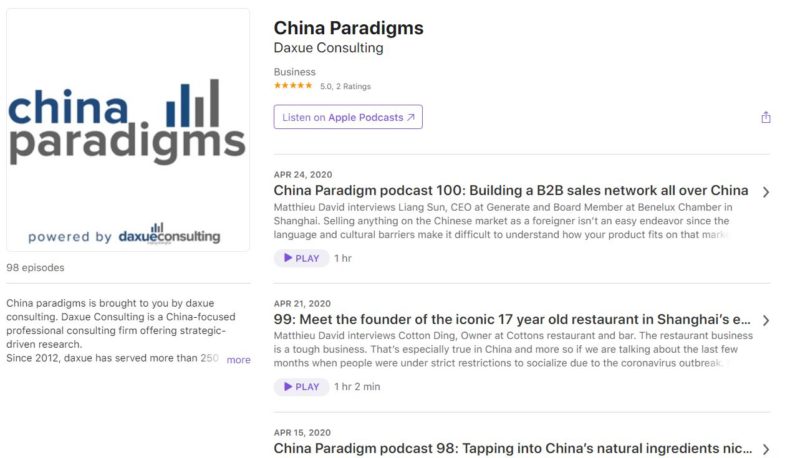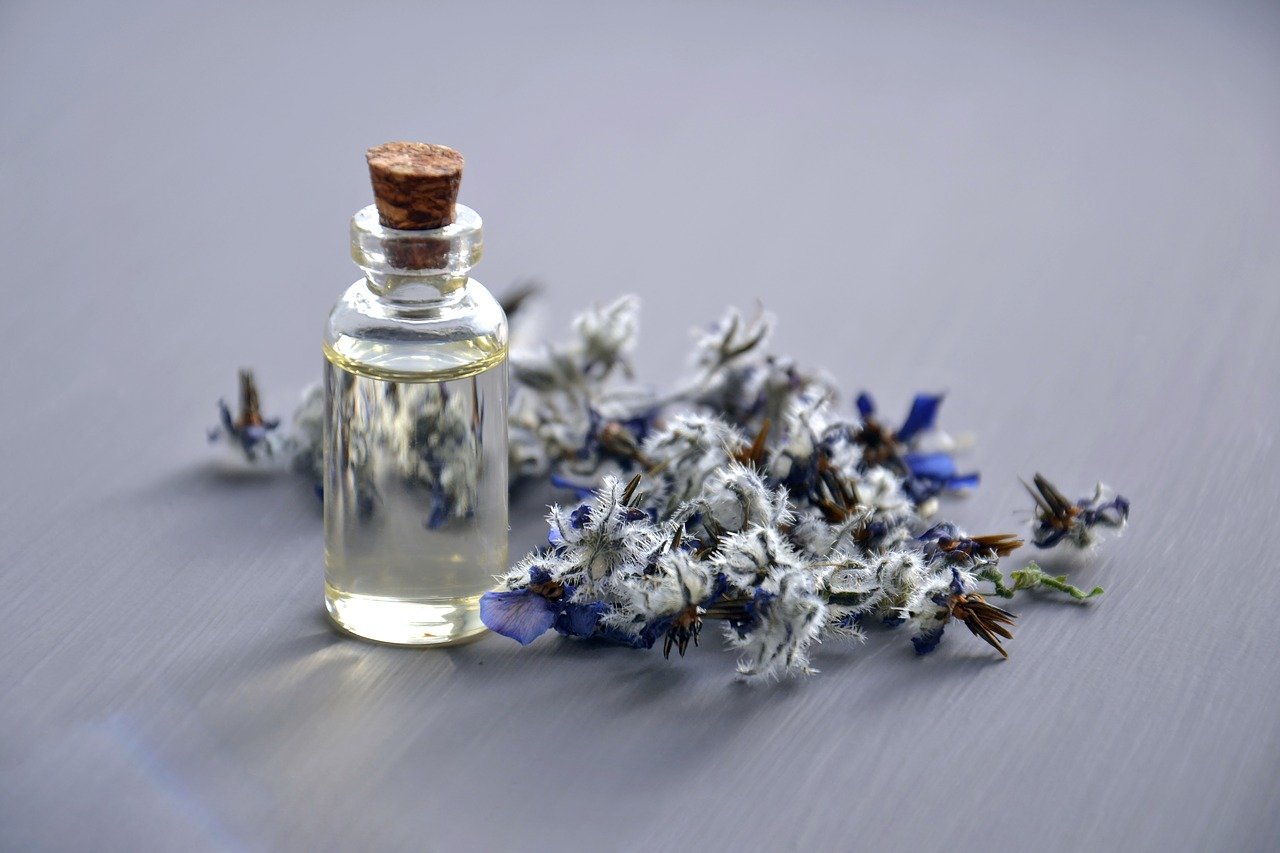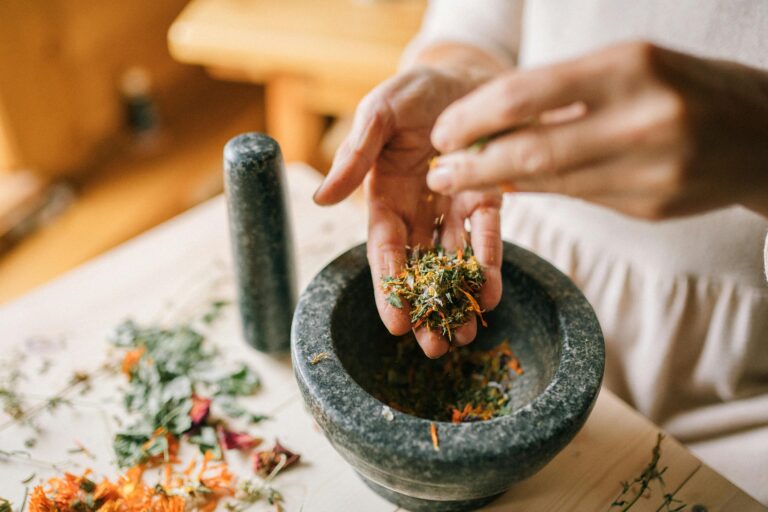Traditional Chinese medicine (TCM) is a healing approach that originated in China thousands of years ago. Chinese herbal medicine has a long historical tradition. Ancient herbology in China focused on potions whose function was part medicinal and part magical. In China today, traditional Chinese herbal medicine is used alongside conventional pharmaceutical treatment. Many brands have started to incorporate TCM elements in products on the Chinese market.
The traditional Chinese medicine market comprises about 30-40% of drug sales in China. It also displays more rapid growth than other segments of the pharmaceutical market in China. Surprisingly, not only pharmaceutical companies use traditional Chinese medicine in marketing. Some domestic and foreign cosmetic brands use it to promote their products.
Traditional Chinese medicine flourished due to COVID-19 outbreak
The outbreak of the coronavirus has shown the important role of traditional Chinese medicine among today’s consumers. Notably, the Chinese government has set TCM as a strategic priority to support the development of the medical industry. The policies issued will facilitate progress in TCM medical care, scientific research, education, and culture. It will encourage the establishment of a more sophisticated TCM service network that covers both urban and rural areas. Furthermore, the State Council called for the protection and industrialization of TCM herbs and innovation in the TCM industry.
The forecast predicts that the market of traditional Chinese medicine market will grow and reach 796 billion yuan in 2022. The COVID-19 outbreak greatly contributed to this growth.
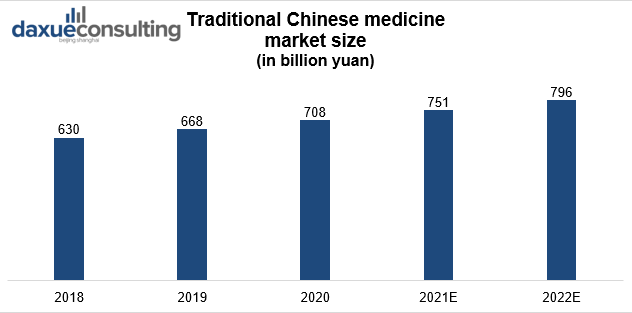
Data Source: Statista, graph by daxue consulting, traditional Chinese medicine market size
Changes in consumers’ preferences in beauty industry due to COVID-19 outbreak
As the society in China recovers from COVID-19, health and safety are now key concerns of more Chinese people. This will likely inspire the cosmetics market in China to focus more on products with natural and healthy concepts. For most beauty consumers, after COVID-19, they would only purchase necessities. Apart from the high concern of cost- performance ratio, Chinese consumers also prefer beauty products with eco-friendly and natural ingredients.
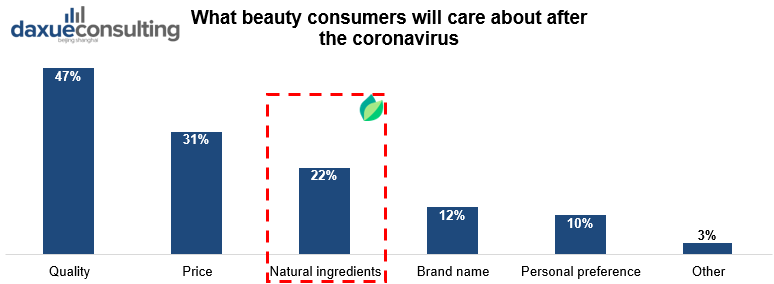
Data Source: Jumeili, graph by daxue consulting, beauty consumer post coronavirus behavior survey February 2020
COVID-19 had different degrees of impact on different categories in the beauty market. The epidemic had a more negative impact on cosmetics than skincare products, while personal care products were gaining more popularity in this period.
Skincare products based on TCM are getting popular
The cosmetics’ sales volume in China declined by 29.9% in February 2020 compared with the same period last year.
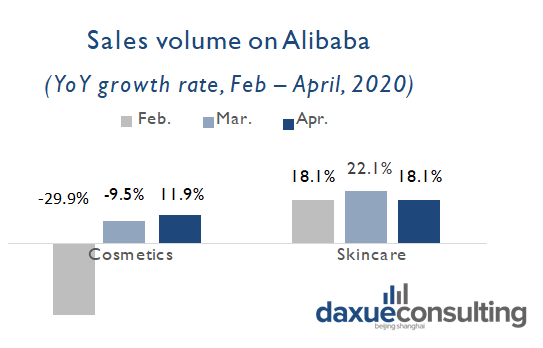
Data Source: SCMP, graph by daxue consulting, sales volume on Alibaba
During the outbreak, people consumed and talked more about skincare products than cosmetics. Also, Chinese citizens showed more passion for discussing and sharing their skincare experience at home. As consumers become more knowledgeable and sophisticated, they are tending to consider a product’s ingredients as a key part of the decision-making process when purchasing skin care products. Besides, due to the damage from wearing face masks for a long time, “skin repair” functions had become a hot keyword among Chinese beauty consumers.
As the clean beauty movement continues to gain momentum, more skincare brands are looking to traditional Chinese medicine to source natural ingredients that are chemical-free and effective.
As a result of wearing facemasks and frequently using disinfectants, many Chinese are finding they have sensitive skin, and desire products that can help with their sensitivity. Therefore, many brands use traditional Chinese medicine in marketing highlighting its’ good performance for sensitive skin.
TCM in marketing in the beauty industry
TCM ingredients as a beauty trend among Chinese millennials and Gen Z
Long favored by the older generation, TCM-based cosmetics are now becoming popular among young people. “Natural”, “green”, “clean” – these words are spreading profusely amongst Chinese influencers and KOLs nowadays to promote “green beauty” on the Chinese social platforms. With Chinese consumers’ upsurge in household income, there is a stronger demand for skincare products with natural ingredients as these consumers are able to pay for a premium to derive the benefits of organic beauty products. According to market research firm Kantar, 54% of Gen-Z consumers say they value plant-based skincare when asked about skincare concepts.
TCM in marketing uses non-toxic and “all natural” origin to attract many Chinese millennial shoppers. A recent study by US consulting firm AlixPartners revealed that nearly three quarters of respondents from a survey of more than 4,500 consumers in China, France, Germany, the UK and the US want “clean” beauty and personal care products with natural or organic ingredients. That proportion rises to 90 percent for Chinese consumers, with millennials among those having the highest demand.
Just as in the West, China’s millennials and Gen Zs are turning to TCM to solve their skincare and beauty concerns – with a tinge of pride for their cultural heritage.
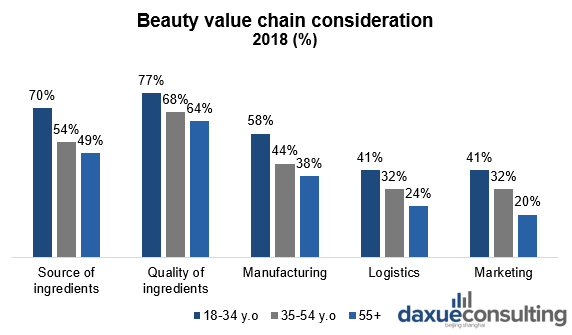
Data Source: AlixPartners, graph by daxue consulting, beauty value chain consideration, China, France, Germany, the UK and the US
Pien Tze Huang – pioneer TCM company entered beauty industry
Pharmaceutical companies in China that handle TCM products have been increasingly entering the cosmetics-making business using traditional Chinese medicine in marketing. This is because the continually rising costs of raw herbal medicinal ingredients are making it difficult to keep TCM product prices down. It forces these pharmaceutical companies to find a new source of revenue. The leading solution to this is cosmetics that can incorporate these raw herbal medicinal ingredients.
A pioneer in this initiative is Pien Tze Huang. The company traditionally makes medicines for treating diseases of the liver and bile duct as well as antipyretics for fevers. Pien Tze Huang began selling skincare products in 1980. Using TCM in marketing of their cosmetics business, company’s sales grew from 56 million yuan (US$7.9 million) in 2002, to 430 million yuan (US$60.6 million) in 2019. With a 57.1% increase from the previous year, their 2019 sales account for 7.5% of their consolidated net sales of 5.72 billion yuan (US$806 million).
Pien Tze Huang’s current favorable condition is due to their clear emphasis on young people as their target. In December 2018, they released a PR video titled “Don’t call me a Jie (Lady), call me a XiaoJieJie (Young Lady)”. It featured a group of three women singing about their skin-related troubles. Views of the video on Weibo surpassed 230,000, and the company even opened an account on Douyin. It also ran a hashtag challenge during the same period, views of which surpassed 2.9 billion.
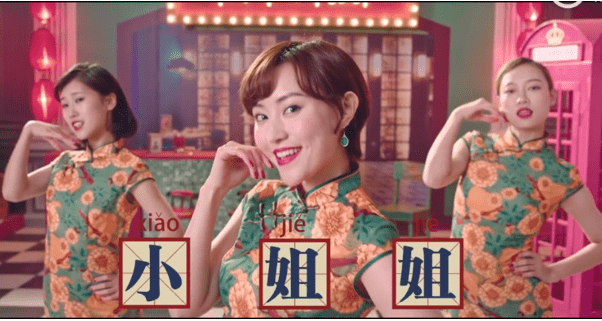
Source: Weibo, Pien Tze Huang’s PR video
Traditional Chinese medicine in marketing of Chinese brands
WEI beauty: first Chinese skincare TCM brand to launch at Sephora
Created on the principles of traditional Chinese medicine, WEI combines the benefits of centuries-old Eastern remedies with modern day Western technology to deliver proprietary, efficacious skincare. Formulated with potent active ingredients, the highest-quality traditional herbal formulas, WEI is distinguished as an authority in holistic beauty. It is one of the most popular prestigious skincare brands using traditional Chinese medicine in marketing.
Founder Wei Young Brian’s passion for the healing powers of TCM remains at the brand’s essence. WEI Beauty found an audience in China thanks to a partnership with global chain Sephora in 2013. Younger customers are attracted to the brand not only because of the TCM roots in their lives and culture, but also because of the product efficacy and the fact that they’re proud of using Chinese-made, high-quality skincare products.
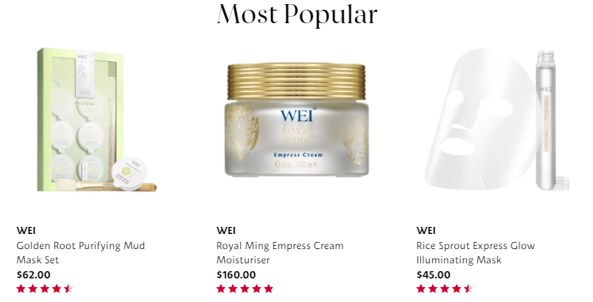
Source: Sephora official website, WEI’s top products
Consisting of everything from eye creams to cleansers, Wei uses a unique blend of Chinese herbs (sometimes more than 20) to help address a wide variety of concerns, including aging and dull skin.
Herborist: brand inspired by traditional Chinese medicine
An increasing number of Chinese brands use traditional Chinese medicine in marketing of their products. Launched in 1998, Herborist is the first modern Chinese beauty brand based on TCM. By mixing TCM elements with modern design, the brand appeals more and more Chinese consumers.
On the occasion of its 10th anniversary, the brand launched a perfume Mon Instant, exclusively for the Chinese market. Distributed worldwide, Herborist has become the symbol of the Chinese brands that assume their origin.
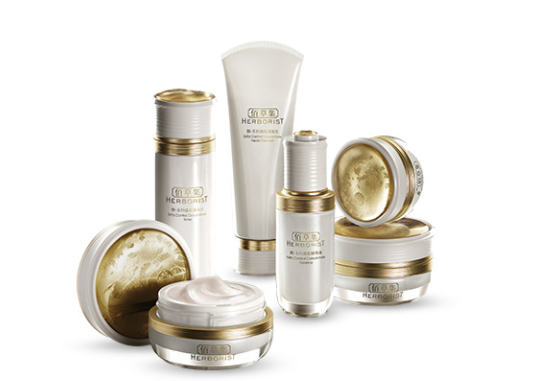
Source: Herborist, Whitening Series containing TCM ingredients
In China, the TCM-beauty brand’s whitening series is especially popular. Inspired by whitening formulas from the imperial palace court known as “Qi Bai Gao”, Herborist uses seven different herbal essences: Atractylodes macrocephala, Paeonia lactiflora Pall, Bletilla striata, Ampelopsis japonica, Smilax china, cortex dictamni and Tribulus terrestris L.
Thy are rich in a variety of active ingredients such as polysaccharides, flavone and amino acids. These ingredients are helpful for energizing and moisturizing skin. Each ingredient reinforces the others’ effects to provide skin with balanced nourishment. Treating skin with these seven ingredients provides appropriate nourishment and returns it to a natural state of balance, to reveal its natural radiant glow. Using TCM in marketing helps Herborist to be successful not only in the Chinese market, but also in the USA and Germany.
Traditional Chinese medicine in marketing of foreign brands
LVMH is conquering Chinese luxury cosmetic segment using TCM in marketing
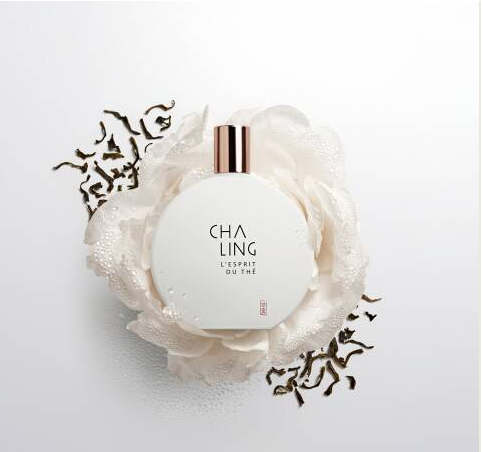
Source: LVMH, Cha Ling brand which leverages traditional Chinese medicine ingredients
In 2016 LVMH China launched its’ beauty and wellness brand Cha Ling. This was the first time a foreign luxury cosmetics brand used TCM in marketing. It’s the French luxury conglomerate’s first foray into Traditional Chinese Medicine and a doubling down of the conglomerate’s investment on China. Cha Ling brand entered the Chinese market with l’Esprit du Thé perfume.
The idea was to unite heritage French savoir-faire ventures with the Yunnan Province, specifically the Xishuangbanna region. It is a region untouched by pollution and home to an ecosystem producing the world’s oldest variety of Pu’Er leaves. Cha Ling largely avoids most of the hazards which typically accompanies essentially European adoption of authentically Chinese ingredients.
Cha Ling initially adopted the Euro-centric model of “origin” or provenance story as a core marketing tool which eventually pivoted to the SK-II model of focus on ingredients. Its championing of Pu’Er and with a third of its founding members being an ethnic Chinese woman, makes Cha Ling a particularly admirable success story. It also helps that Guerlain CEO Boillot is passionate about Chinese culture. Mix of well-known European brand and traditional Chinese medicine in marketing makes Cha Ling successful in the market.
Cha Ling is also the first cosmetics house to integrate the anti-oxidant, anti-ageing and anti-pollution properties of Pu’Er tea from forests that are thousands of years old in China’s Yunnan province.
Cha Ling’s innovative product
Cha Ling’s top-selling Infusion Serum is a powerful age defying treatment that reduces fine lines and wrinkles while firming and increasing the elasticity of the skin. With the highest concentration of B-DT Complex, and ultra-hydrating texture it effectively counters the effects of skin ageing.
Amway’s botanical research center – plans for integration of TCM in their products

Source: WeAreGorilla, Amway’s botanical research center project
Amway officially unveiled the US$25 million Amway Botanical Research Center in Wuxi in 2015, and the company has been studying plants associated with Traditional Chinese Medicine at the site for potential future use in its health and beauty products.
Amway is also introducing Western sustainable farming techniques to grow plants used in Traditional Chinese Medicine, such as Goji berry (Chinese wolfberry), evodia and chrysanthemum.
In 2017 the Amway Botanical Research Center (ABRC) in collaboration with Institute of Chinese Materia Medica China Academy of Chinese Medical Sciences (ICMM) completed the first ever of the whole genome of plant from the Genus Chrysanthemum. “Chrysanthemum is a highly evolved flowering plant that includes many cultivar varieties of the species,” said Jia Chen, Vice President of Amway Botanical Research Center. “We are very excited to learn more about what this means for our studies of Traditional Chinese Medicine plants and how to integrate these findings into future product development.”
The Amway Botanical Research Center is the latest showcase of Amway’s continuous efforts to research and understand Chinese botanicals to a greater extent – using the most advanced technology and scientific practices. In the future, it will help Amway to use traditional Chinese medicine in marketing.
Using TCM in marketing is the next step for many beauty brands in China
- As more and more consumers are concerned about natural ingredients in products, incorporating Chinese traditional medicine can be a great way to promote your product.
- As Chinese traditional medicine is getting popular in the West, foreign brands also can take this strategy into consideration.
- Using natural ingredients can attract young consumers who care about sustainability.
In addition to the TCM beauty market, the male beauty market in China is also booming
Listen to over 100 China entrepreneur stories on China Paradigms, the China business podcast
Listen to China Paradigm on Apple Podcast
